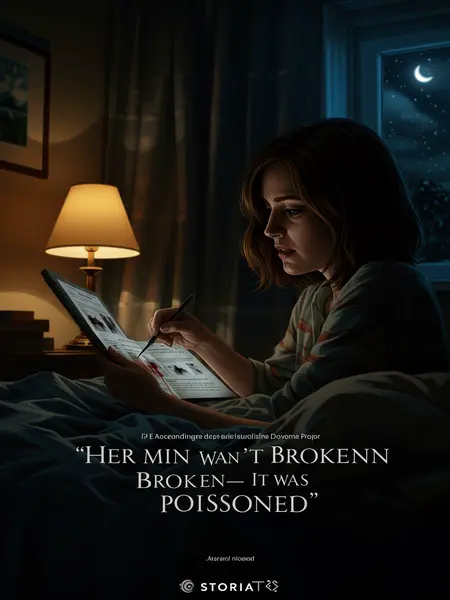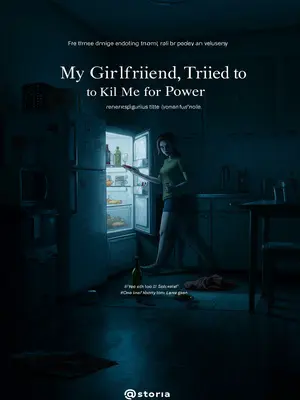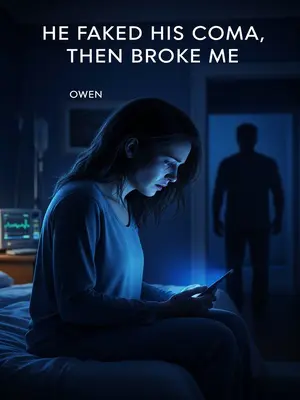Chapter 1: The Night Ms. Parker Arrived
I once encountered a case where finding the cause of the illness was extremely challenging, and I'd like to share it with everyone:
It was one of those nights in the ER when the fluorescent lights buzzed overhead, and you could smell burnt coffee and a faint trace of antiseptic in the air. The waiting room TV played a muted rerun of Jeopardy! while a tired nurse scribbled notes at the triage desk. The patient, Ms. Parker, was a 40-year-old senior manager in a corporate department in Fresno. On paper, she had it all—a corner office, a family, a mortgage nearly paid off. But lately, nothing felt right.
Ms. Parker was the sort of woman you'd expect to see leading a morning team meeting, her crisp suit immaculate, her hair always in place. But one day, her family rushed her to the emergency room. Her condition was urgent, but thankfully, her vital signs were still stable. The anxiety on their faces was palpable, their voices hushed and worried as they hovered near the sliding glass doors.
After asking a few questions, I learned that Ms. Parker's situation was very complex. Her husband spoke quickly, voice tight with exhaustion and fear, as he tried to make sense of it all for me.
Here's what happened:
On the morning of the previous day, Ms. Parker suddenly told her husband that someone was following her. She was pale, glancing over her shoulder even inside their own kitchen, coffee mug trembling in her hand.
When her husband heard this, he was both angry and frightened. He slammed his hand on the kitchen counter, exasperated. “Somebody following her? In Fresno? That just didn’t add up.” His mind jumped to news stories about stalkers, crime statistics he’d half-listened to on local radio, wondering if he should call the cops or just change the locks again.
What if someone really wanted to harm his wife? What was he supposed to do then? The idea of real danger lurked just beneath his worry, mingling with disbelief. He checked their home security cameras twice that morning, though he didn't admit it to her.
But what his wife said next left him even more confused, torn between believing her and doubting her. She grabbed his arm, eyes wide, and whispered, "Do you know how I know someone is following me? Because I have superpowers. I heard someone using telepathy to quietly tell me that someone was peeking at me from the corner..."
She pressed her coffee mug to her lips, hands shaking, eyes darting to the window like she expected it to shatter. Her words left him worried and even a little scared. His mind raced—was this some kind of elaborate joke? Was she testing him? But her trembling hands and haunted eyes said otherwise. He felt a coldness seep into the room, as if the world had tilted just a bit.
Superpowers? Telepathy? What on earth was this? His wife had always been logical, even skeptical of the supernatural. Now, hearing her say this, he felt a pit open in his stomach.
Was this still the wife he knew so well? He tried to tell himself it was stress talking, that maybe work was just too much lately. But deep down, he was scared.
He thought the matter would pass, but unexpectedly, two days later, his wife said the same thing again. This time, her eyes darted to the living room window as she spoke, as if expecting to see someone lurking outside.
On top of that, some of her colleagues at work contacted him privately, telling him that his wife's behavior at the company had been very strange and unpredictable these past few days. He'd received a late-night email from her assistant, and even a call from the HR manager, both of them hesitant but clearly worried.
For example, she would lose her temper for no reason, talk to the wall, laugh to herself, or suddenly look terrified all by herself. Some of the younger employees were unsettled, and the office grapevine had begun to buzz. Her coworkers started whispering in the break room, their voices blending with the hum of the microwave and the drip of the Keurig. Slack messages pinged: “Did you see Parker today? Is she okay?”
Now her husband's head was spinning—oh no, this time there was really a problem. He scrolled through mental health forums on his phone, thumb trembling, the blue glow painting his face as the house creaked around him. He read articles about mental health, all while his wife paced their bedroom, talking to herself. The weight of helplessness pressed down on him, heavy as a lead blanket.
He stopped working and hurriedly drove his wife to a nearby major hospital to find out what was wrong. He barely remembered the drive, only that he ran a red light and didn't even care. In the waiting room, he filled out forms with shaking hands, eyes darting to the triage clock.
The admitting doctor asked a few questions, learned that the patient was having delusions and hallucinations, and quickly referred her to psychiatry. The hospital's overhead speakers called for a psych consult, and Ms. Parker was wheeled down a corridor lined with faded inspirational posters.
The psychiatrist examined her and said Ms. Parker had auditory and visual hallucinations. After a careful analysis and a cranial CT scan that showed no abnormalities, the diagnosis was schizophrenia. The words hung in the air, sharp as glass.
This was a bolt from the blue for the couple. They stared at the doctor, stunned into silence. Outside, ambulances wailed past, but inside the exam room, everything felt muffled and far away.
How could someone suddenly develop schizophrenia out of nowhere? Her husband scrolled through his phone under the harsh waiting room lights, searching for answers. He found forums, statistics, and the same phrase again and again: "early adulthood onset."
Ms. Parker's husband couldn't make sense of it, but though he felt helpless, he had no choice but to accept reality. He squeezed her hand, trying to be strong, but she looked right through him. The world they'd built together suddenly felt fragile, as if it could crumble with one more tremor.
The doctor said it might be related to genetics, or possibly due to work stress, or other factors. He tried to recall if anyone in either family had ever suffered from anything similar, but nothing came to mind. The idea of stress as a cause felt both plausible and terribly vague.
In short, the cause was unknown. The doctor’s voice was gentle but firm, explaining the limits of medical knowledge. The unknown stretched before them, a chasm neither could cross.
To rule out organic brain lesions, such as brain tumors, the doctor suggested a cranial MRI, which also turned out normal. Ms. Parker did not have a brain tumor. Her husband felt both relief and a renewed sense of dread—the problem was invisible, intangible.
So, schizophrenia was considered primary. The psychiatrist explained the term carefully, but the husband barely absorbed it. The words swirled in his head, mixing with memories of happier days.
"Primary" here means the cause is unknown, or at least no specific disease has been found to explain the symptoms, so it is treated as primary schizophrenia. He nodded, not really understanding, his mind still racing for other explanations.
The doctor prescribed antipsychotic medication for Ms. Parker, and the effect was actually quite good. He left the pharmacy with a white paper bag, clutching it like a lifeline. The directions were simple enough, but the implications felt overwhelming.
After taking the medication, Ms. Parker's strange behaviors decreased significantly. She no longer claimed to have superpowers, no longer talked to the wall, and no longer said someone was following her. For the first time in weeks, her husband felt a sliver of hope.
But after taking the medicine, Ms. Parker's energy also plummeted. She was drowsy all day and felt weak all over. She slept through whole afternoons, the TV murmuring in the background, her husband folding laundry in the next room and missing her laughter.
Forget about working—even ordinary household chores became difficult, and she couldn't muster any motivation. Her husband did the laundry and dishes, quietly picking up the slack, but he missed their old rhythm—their shared laughter over burnt toast or a late-night sitcom.
This was simply a disaster. It felt like everything that defined their lives together was slipping away, replaced by silence and uncertainty.
Her husband was extremely worried as well. He made more coffee than he could drink, pacing the house as if movement could shake off the gloom.
They visited several hospitals, including specialized psychiatric centers, and all agreed that she had schizophrenia, prescribing similar medication. Each time, the familiar routine: forms, waiting rooms, polite doctors repeating the same phrases. It was a carousel they couldn't get off.
When the doctor said the disease was incurable, her husband felt an indescribable sorrow. It was a kind of grief for a future that might never come, for plans quietly abandoned.
After so many years as a couple, such a sudden change left him completely at a loss. He called his sister in Ohio, trying to explain what was happening. She listened, offering sympathy, but there were no answers. His sister from Ohio sent DoorDash gift cards and called every night, her voice a lifeline through the static.
Still, he mentally prepared himself to go through thick and thin with his wife. If all else failed, they would go to Chicago, find a larger hospital, and spend whatever it took. He calculated finances, checked insurance coverage, and made lists of specialists to call.
But the night before they planned to leave for Chicago, Ms. Parker's condition suddenly worsened. The house felt too small, every clock ticking too loud as she spiraled into confusion and distress.
She was crying and laughing at home, talking nonsense, and even showed signs of self-harm. Her husband watched helplessly as she scratched her arms, sobbing and then giggling, her face streaked with tears.
This terrified her husband. He grabbed his phone, hands shaking, dialing 911 before he could talk himself out of it. The dispatcher’s calm voice was a lifeline in the storm.
He immediately called 911 and rushed her to the emergency room. The ambulance arrived with lights flashing, neighbors peeking through blinds. He followed in his own car, running every yellow light along the way.
That was the first time I met this patient. It was well past midnight. The waiting room was quiet, only a janitor mopping near the vending machines. The urgency was unmistakable.
My first impression was that she seemed like she was completely out of it. She didn't make eye contact, her hands fidgeting with the frayed hem of her shirt.
Her hair was a mess, her expression blank, her eyes dull. In the harsh ER lighting, she looked far older than forty. I made a mental note: this was not the high-powered manager I'd expected from her file.
You see all kinds of patients in the ER, but this was my first time encountering someone with schizophrenia. I’d dealt with plenty of psychiatric emergencies—suicidal teenagers, manic episodes—but never this.
At the time, I didn't have much experience dealing with this kind of illness, and I was inwardly groaning. My mind flickered to the patients already lined up in the hallway, the paperwork still waiting on my desk. This was going to be a long night.
To admit such a patient in the middle of the night—what a headache! I glanced at the wall clock, wishing for coffee, but then steeled myself. This was the job.
But when I saw her husband's bloodshot eyes, all my complaints faded away. He looked utterly defeated, shoulders slumped, clothes wrinkled from days without real rest. Something in his gaze—resignation mixed with love—hit me hard.
I knew the most miserable person was not me, but the haggard, weathered husband in front of me. I offered him a chair, and he collapsed into it, hands trembling. You could feel the weight of the past weeks bearing down on him.
He had already endured everything that had happened, and he told me all about it. His words spilled out in a jumble, desperate for someone to understand.













